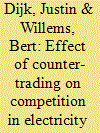| Srl | Item |
| 1 |
ID:
166306


|
|
|
|
|
| Summary/Abstract |
This paper examines market structure, regulation, and market performance of the Dutch electricity retail market for households since its opening in 2004. Using data containing monthly prices for all products offered in the Dutch retail electricity markets over the period 2008–2014, we provide quantitative results on the intensity of retail competition and the benefits to consumers. Regulation of the retail electricity market is relatively intensive and encompasses structural measures, contractual restrictions, rules on information provision, price surveillance and market monitoring. In contrast to most other countries, the Dutch regulation includes a kind of price regulation which is that the regulator surveys all new retail prices before market introduction in order to prevent too high retail prices. The Dutch retail electricity market has remained relatively concentrated, with retailers offering an increasing variety of retail products, often using multiple brands. Competition is characterized by product innovation, especially for green energy, rather than price competition on homogenous products. Gross retail margins remain relatively high, as is price dispersion across retailers. The market matured, as evidenced by fewer consumer complaints and higher switching rates.
|
|
|
|
|
|
|
|
|
|
|
|
|
|
|
|
| 2 |
ID:
103482


|
|
|
|
|
| Publication |
2011.
|
| Summary/Abstract |
In a competitive electricity market, nodal pricing is the most efficient way to manage congestion. Counter-trading is inefficient as it gives the wrong long term signals for entry and exit of power plants. However, in a non-competitive market, additional entry will improve the competitiveness of the market, and will increase social benefit by reducing price-cost margins. This paper studies whether the potential pro-competitive entry effects could make counter-trading more efficient than nodal pricing. We find that this is unlikely to be the case, and expect counter-trading to have a negative effect on overall welfare. The potential benefits of additional competition (more competitive prices and lower production cost) do not outweigh the distortions (additional investment cost for the entrant, and socialization of the congestion cost to final consumers).
|
|
|
|
|
|
|
|
|
|
|
|
|
|
|
|